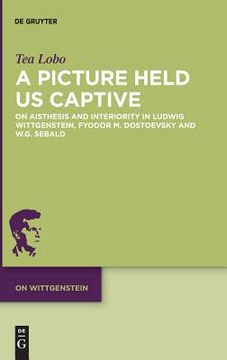Share
A Picture Held us Captive: On Aisthesis and Interiority in Ludwig Wittgenstein, Fyodor m. Dostoevsky and W. G. Sebald (on Wittgenstein)
Tea Lobo
(Author)
·
de Gruyter
· Hardcover
A Picture Held us Captive: On Aisthesis and Interiority in Ludwig Wittgenstein, Fyodor m. Dostoevsky and W. G. Sebald (on Wittgenstein) - Lobo, Tea
Choose the list to add your product or create one New List
✓ Product added successfully to the Wishlist.
Go to My Wishlists
Origin: U.S.A.
(Import costs included in the price)
It will be shipped from our warehouse between
Wednesday, June 12 and
Friday, June 28.
You will receive it anywhere in United Kingdom between 1 and 3 business days after shipment.
Synopsis "A Picture Held us Captive: On Aisthesis and Interiority in Ludwig Wittgenstein, Fyodor m. Dostoevsky and W. G. Sebald (on Wittgenstein)"
While there are publications on Wittgenstein's interest in Dostoevsky's novels and the recurring mentions of Wittgenstein in Sebald's works, there has been no systematic scholarship on the relation between perception (such as showing and pictures) and the problem of an adequate presentation of interiority (such as intentions or pain) for these three thinkers.This relation is important in Wittgenstein's treatment of the subject and in his private language argument, but it is also an often overlooked motif in both Dostoevsky's and Sebald's works. Dostoevsky's depiction of mindset discrepancies in a rapidly modernizing Russia can be analyzed interms of multi-aspectivity. The theatricality of his characters demonstrates especially well Wittgenstein's account of interiority's interrelatedness with overt public practices and codes. In Sebald's Austerlitz, Wittgenstein's notion of family resemblances is an aesthetic strategy within the novel. Visual tropes are most obviously present in Sebald's use of photography, and can partially be read as an ethical-aesthetic imperative of rendering pain visible. Tea Lobo's book contributes towards a non-Cartesian account of literary presentations of inner life based on Wittgenstein's thought.
- 0% (0)
- 0% (0)
- 0% (0)
- 0% (0)
- 0% (0)
All books in our catalog are Original.
The book is written in English.
The binding of this edition is Hardcover.
✓ Producto agregado correctamente al carro, Ir a Pagar.

